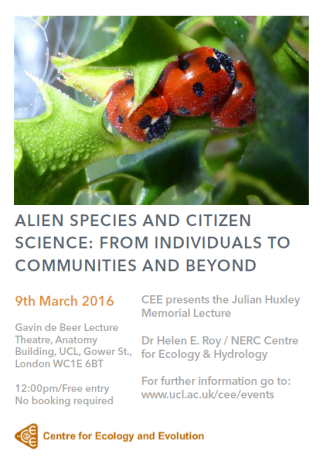The Huxley Lecture is hosted every year in November. The CEE Committee will be rebranding this lecture to ensure we capture a diverse audience and have a range of events.
- -
-
- 2021
-
- 2020
-
- 2019
-
- 2018
-
- June 7th 2017
Speaker: Prof Christl Donnelly FMedSci, Imperial College London
Title: 'An epidemiologist's life on the edge (of the science-policy interface)'
Abstract:
Ebola, MERS, pandemic influenza, SARS and Zika have all posed serious threats to our health and economic wellbeing in recent years. In each of these cases, statistical (and more broadly mathematical) epidemiologists contributed to top-level policy discussions of diseases control policy development, implementation and contingency planning. The methods build upon foundations of epidemiological modelling and analysis of both human and animal diseases (HIV/AIDS, BSE, vCJD, bovine TB and foot-and-mouth disease, among others). The potential impact of such analyses is enormous, but it can be challenging to provide robust answers to key scientific and policy questions. In the midst of an epidemic response effort, it really does feel like living on the edge.
Bio:
Prof Christl Donnelly FMedSci, FRS is a statistician and epidemiologist studying the spread and control of infectious diseases, with a particular interest in outbreaks. Since 2000, she has worked at Imperial College London. Christl has studied Zika virus, Ebola, MERS, influenza, SARS, bovine TB, foot-and-mouth disease, rabies, dengue, BSE/vCJD, malaria and HIV/AIDS (among others!). She is a leading member of the WHO Ebola Response Team (2014-). She was also deputy chair of the Independent Scientific Group on Cattle TB (1998-2007) which designed, oversaw and analysed the Randomised Badger Culling Trial. In addition to epidemiology and disease control, she is interested in conservation and animal welfare. She is an Honorary Fellow of the Zoological Society of London and recently received a Suffrage Science award http://suffragescience.org/.
- Wednesday March 9th 2016 - University College London

Speaker: Prof Helen Roy, Centre for Ecology and Hydrology
Title: 'Alien species and citizen science: from individuals to communities and beyond'Abstract:
The number of new species arriving in the UK, and indeed across Europe, is increasing rapidly. There are now more than 2000 established non-native species in the UK and about 15% of these species threaten biodiversity, the economy and/or society. Here I provide an overview of invasion biology specifically focusing on recent trends and future predictions. I highlight the invaluable contributions of the volunteer recording community to our understanding of invasion biology. There is a need to increase understanding of community and ecosystem-level effects of invasions and I suggest that detailed field observations, through biological recording, will provide the spatial, temporal and taxonomic breadth required for such research.Biological recording involves an estimated 70 000 people annually in the UK representing more than 85 schemes and societies covering a diverse range of taxonomic groups. Biological records make a vital contribution to monitoring of species because the datasets are long term (spanning centuries), have large geographic extent and are taxonomically diverse. The large spatial coverage and increasingly fine-scale spatial precision of biological records enable the exploration of large-scale processes that would simply not be possible without the contribution of voluntary recorders. The range of outputs from atlases showing national distributions (12 127 species from over 40 taxonomic groups) to quantified trends (to date 1636 species have been assessed) demonstrate the immense value of biological records. There is no doubt that innovative technologies and the development of statistical approaches are taking biological recording in new and exciting directions. Biological recording has a bright future with benefits for people, science, and nature.
Bio:
Helen is a group Head and Principal Scientist leading zoological research within the UK Biological Records Centre (part of the NERC Centre for Ecology & Hydrology), which is the UK focus for terrestrial and freshwater species recording. The BRC database contains over 15 million records of more than 12000 species. Helen’s work focuses on the use of large-scale and long-term datasets on the distribution and abundance of species to understand and predict the effects of environmental change on biodiversity. The current focus of her research is predicting the biological impact of invasive alien species (IAS). Helen has worked on IAS for 10 years and as a community ecologist for 20 years. Helen has worked extensively on ladybirds using the harlequin ladybird, Harmonia axyridis, as a model system for exploring invasions. She has a particular interest in the role of parasites in invasion and has been extending her research to consider the concept of alien pathogens. She is responsible for maintenance and further development of the Delivering Alien Invasive Species Inventories for Europe (DAISIE) web database, and the GB-Non-Native Species Information Portal (GB-NNSIP). The GB-NNSIP provides information to underpin IAS strategy in GB and also includes an effective system for early warning for the funding body (Defra). In addition Helen developed the GB biodiversity indicator for IAS. Recently she led a consensus workshop, on behalf of Defra, to derive a list of IAS predicted to arrive, establish and threaten biodiversity within GB. She subsequently led a number of EU projects to inform the new EU Regulation on Invasive Alien Species, specifically horizon scanning for new threats to Europe. Helen led the task “Establishment of an EU information system on alien and invasive alien species” as part of the EU IAS strategy consultation. She is the chair of the COST Action ALIEN Challenge (TD1209) which has been implemented to link and analyse information on IAS across Europe. ALIEN Challenge involves collaborations across more than 35 countries. Helen also has extensive expertise in citizen science and led a major review which was published both as an extensive report and a guide to citizen science. Helen was awarded the Zoological Society of London prestigious Silver Medal in recognition of her contribution to understanding and appreciation of zoology, recognising her leading role in science communication. In 2015 she was included within the BBC Wildlife Magazine wildlife “power list” for contributions to mass participation citizen science.
 Close
Close

